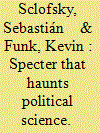| Srl | Item |
| 1 |
ID:
167344


|
|
|
|
|
| Summary/Abstract |
More than a decade after the observation that an “interpretive turn” was percolating through political science, there are clear indications of growth in the perceived legitimacy of interpretive scholarship. Both accompanying and contributing to interpretivism’s ascent has been the regular staging of Methods Cafés at various conferences in and beyond the discipline. First held at the 2005 meeting of the Western Political Science Association, the Methods Café subsequently landed at the 2006 conference of the American Political Science Association. The Methods Café has become an institutionalized feature of these and other conferences. This reflection looks at the past, present, and future of these events, as well as the key role they have played in making interpretivism visible in the discipline. In particular, I highlight their function as non-hierarchical intellectual spaces that promote teaching, learning, and interpretivist community building. Further, I offer friendly but not uncritical commentary on the successes and limitations of the Methods Café.
|
|
|
|
|
|
|
|
|
|
|
|
|
|
|
|
| 2 |
ID:
157856


|
|
|
|
|
| Summary/Abstract |
We compiled an original database of syllabi for introductory, graduate courses from top-ranked US departments to assess the extent to which elite international relations and comparative politics scholars engage with Marx. Analysis of those syllabi overwhelmingly demonstrates that even superficial engagement with Marx or the Marxist tradition is exceedingly rare. We argue that the reasons behind this near-total absence are more political than intellectual and include the embrace of the defeatist, neoliberal logic of the “end of history.” While mainstream disengagement from Marx is perhaps unsurprising, many “critical” political scientists also ignore and/or misread Marx, often because of his purported Eurocentrism. Though Marx’s writings at times evince ethnocentric biases, Marx engaged in extensive efforts to grapple with the specificity of the non-European world. Further, these critics fail to account for how thinkers around the globe have found value in and made theoretical contributions to the universalist Marxist story. We analyze two such cases: the African anticolonial leader Amílcar Cabral and the Peruvian Marxist theorist and activist José Carlos Mariátegui. We argue that this superficial engagement, misreading, and sometimes the outright ignoring of Marx hinders the discipline’s ability to address important real-world problems or theoretical debates, let alone make political science matter.
|
|
|
|
|
|
|
|
|
|
|
|
|
|
|
|